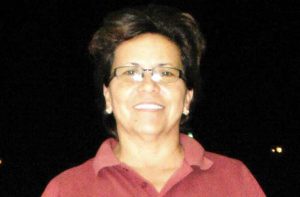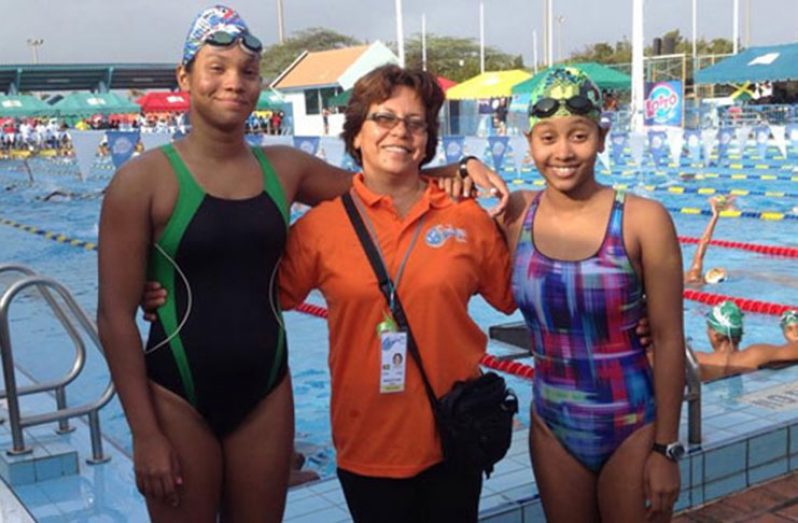IT WAS in the early ‘80s that Stephanie Fraser really got serious about being a swimming instructor.
Now 61, she has managed to rack up quite an impressive list of accomplishments as a coach and administrator in the sport of swimming, not the least of which was being awarded the Medal of Service in 2011 for her longstanding service to the sport.
These days, she’s contemplating scaling back her involvement as a coach, and passing on the mantle to the younger coaches.
And in doing so, she’ll be leaving behind a proud legacy of having not only helped to develop the sport of swimming overall, but making an upstanding representation for women.
Looking back at her journey over the years, Coach Stephanie is happy with how accepting swimming, and even other disciplines, are of female involvement, something she says wasn’t always there.
But fighting to hold her own in a male- dominated arena was a character trait she’d already been nurturing at a younger age when she was competing against her male cousins back in Moruca, Region One, where she grew up and first learned to swim.
“I think as a woman in the area of sports, you have to work doubly harder than the male officials,” Coach Stephanie said.
A MAN’S PROFESSION
“In my field of coaching, it was a man’s profession. And so, for me as a female, getting in there was a lot of opposition. And I had to go through a lot; people kind of sidelined me in a way.
“I had to work harder; and I don’t think it was only me. Sometimes I even felt marginalised,” she mused as she marvelled at how times have changed.
But that’s not to say that there still aren’t things that need to be worked on, she says, as women still need to be taken just a little more seriously.
“It has changed a bit in some areas, but in some areas it has remained the same. We have more female coaches now, and they are more or less being accepted into the mainstream, even in male-dominated sport, as officials,” she said.
“But you find… at least me in my area, I find that the male feels threatened by the females; especially in the management area.
“With decision making, you find that even if a woman makes a decision, and it is the best decision, the male would over-ride us and go with theirs.
“And then eventually, months down the line, they realise that they have made a wrong decision; that maybe they should have gone that way. But they wouldn’t make it as if the woman was right all along; that it boils down to the fact that the female had the right decisions.”
Notwithstanding the difficulties she eventually overcame, Stephanie would not back down; she found too much pride and joy in what she was doing to let obstacles get in her way.
“When I looked at the kids and how they were performing, that was my reward. And it motivated me to push harder. And as such, it was mainly for the love of the sport and for these kids to reach their goal. And when they did reach their goals, I was just as happy as them,” she recalls.
GOOD THING SHE STAYED
And it was such a good thing, she stayed, because, with Stephanie Fraser, swimming just might not have been able to develop to where it is today.
It was Stephanie who was part of the team that was pivotal in the resuscitation of the Guyana Amateur Swimming Association (GASA), and swimming in Guyana as a competition sport back in 1993, after the sport had been dormant for some 15 years or so with the closing of the Luckhoo Pool.

The GASA became affiliated to the Guyana Olympic Association that same year, then a few years later got affiliated to International Swimming Federation (FINA), and went on to see Guyana represent in swimming at the Olympics Games and World Championships.
She’s worked as the national coach, travelling alongside athletes attending world meets.
The FINA Level II also founded the Dorado Swim Club, another one of her prides and joys, which she says she can still boast of being the club to produce the most Olympians.
Those like Olympians Niall Roberts, Britany van Lange and Hannibal Gaskin are all the fruits of Stephanie’s labour. All three are still reigning national record holders, though Gaskin is the only swimmer still currently actively representing Guyana.
She is a certified lifeguard trainer, and also a Level II American Swimming Coaches Association certified coach. And though she had all the critieria requirements to advance to be a Level III certified coach, several barriers, including finances, played a major role in crippling her efforts.
MUCH EASIER NOW
Now, she’s just glad that the process is easier for other upcoming coach, and for making the arena a better place for other females coaches like her protégé Shyka Gonsalves, and even for female swimmers to feel more encouraged to be a part of the sport.
“With having more female coaches, I find that you have more female athletes coming out,” she said, adding:
“And even the males have become more comfortable having us around. They think of us in a motherly way, and can relate to us, at least with me, in a way that they wouldn’t relate to the males.”
Stephanie has several reasons why she’s glad to start phasing out of the sport: She doesn’t want to take away opportunities from the young ones, and she also wants to focus more on working with swimmers at a younger age and then pass them on to the other coaches.
“All this is done voluntarily,” she said. “We coaches in Guyana are not paid, and I’ve been doing it for 33 years; I’ve been coaching voluntarily, and so it’s kind of getting to me now, having to get up at 4:30 every morning. It’s really stressful, especially with the crime rate. I got held up one morning; another morning I was followed.
“I need to step back. And I really want to be looking at the nursery and working with the littles ones so that I could build them up to pass them on to like Shyka; all those young coaches who are excited at the moment. I don’t want to break their spirit, so I need to move off.”
But off course, she will always look back and be proud of her legacy.
“There’s so much more opportunities now for them than there was when I was doing my coaching,” she said.
“I had to struggle and get my own certification through the American Swimming Coaching Association. And at that time, it was very expensive.
It still is, but at least it’s more achievable now.”




.jpg)









